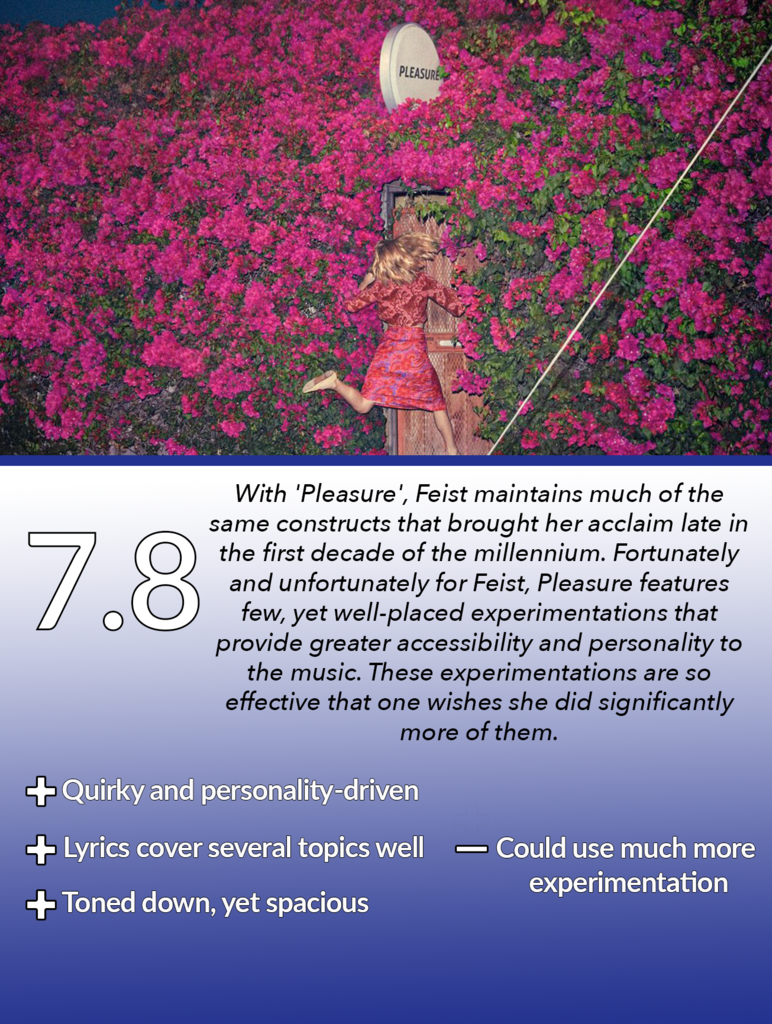Top Tracks:
“Pleasure”
“Lost Dreams”
“Any Party”
“A Man is Not his Song”
“Baby Be Simple”
“I’m Not Running Away”
Other Members of the Pleasure Family:
Sufjan Stevens: Seven Swans
Andrew Bird: the Mysterious Production of Eggs
Kings of Convenience: Riot on an Empty Street
Ten years after her linear breakthrough, The Reminder, Feist forges a masterpiece that wanders and marauds more than soars and illuminates. Pleasure is an objective and removed analysis of humankind’s more base and animalistic behaviors. It is a work that simultaneously haunts and surprises listeners desiring a more detached, impersonal experience. All the ingredients of Feist’s previous four records are present. However, they are all clouded by an impending storm of introspection and Freudian epiphanies with Feist’s airy voice and measured guitar work providing the choicest type of thunder.
Quirks: Samples, pullouts, and stripped-back reverbs abound
Despite Feist’s obvious low-fidelity creation, she still utilizes many nontraditional and synthetic inclusions to further construct Pleasure’s demeanor. “Baby Be Simple” is a 6-minute slow ride that touches on the inherent differences between men and women and how these differences clash to forge stereotypes and behaviors not necessarily desired by their partners. The song features a distant synthetic section that further projects Feist’s message in the song via the synths’ moody and slightly creepy manner. Keeping with the rest of the tracks, “Baby Be Simple” features a tantalizingly slow structure, distant yet punctuated vocals, and an airy yet pastoral sound. At around the four-minute mark, however, Feist’s sincere and isolated vocals suddenly get infiltrated by a far-off cross recording of Feist making what almost sounds like ghost-like hummings. As the song progresses, these “ghost-like hummings” get steadily louder until they almost overtake Feist the singer. This specter-like presence makes the song seem more holy and haunted at the same time; it seems as if Feist is hinting at something here. Mortality? Abuse? Divine romance?
The songs “Any Party” and “A Man is Not His Song” feature random sound samples at their conclusion. “Any Party” is the most consistently rough and heavy (relatively speaking) of any of the Pleasure tracks. Furthermore, the song takes on a light, almost benevolent temperament found in few other submissions off the album. The song closes with a cut of what sounds like someone walking down a street at night with cars driving by in the background. Quaint, and possibly joyous up to that point, the track suddenly ends with a car driving by blasting “Pleasure”, the lead single, and possibly the most haunting and Earthy of all the tracks, just to remind the listeners that Feist the Goddess of the Id is still watching. “A Man is Not His Song” features the most random and confusing cut of the entire album. Another vague yet Freudian-leaning track, “A Man is Not His Song” appears to end as most Feist songs do: gently wavering and traipsing off to a comfortable spot in the forest. This time though, the track ends with a surprisingly smooth, sneaky lead-in to “High Road” by Mastodon, an artist that is about as different from Feist as possible.
The Mastodon inclusion almost feels like an expression of Feist’s personality. It seems as if she’s toying with the audience and is enjoying watching their perplexed looks as they pick their jaws off the floor while listening to the hectic and cacophonous beginnings of “High Road.” On the other hand though, the “High Road” incident acts as a sort of inside joke for both Feist and Mastodon diehards. “A Man is Not His Song” is not the first time that Feist and Mastodon have flitted into the other’s music catalog. In 2012 the pair released a Record Store Day single of each covering one of the other’s tracks. The “High Road” incident is a subtle yet effective thank you and acknowledgement to Feist’s fans who had been bemoaning her extensive musical silence the past 6 years. For everyone else it’s one of the most perplexing and abstract Feist implementations to date.
Meaning: Sigmund Feist
Sex, betrayal, love and family turmoil serve as Feist’s punching bags and cuddling pillows off Pleasure. The previously scribed on “Pleasure” is a deep, dark exploration of our sexual, carnal instincts as humans. Feist’s brief yet continual lyrics provide guidance but also allow for self-reflection for the listener. The track features pastoral acoustic guitar solos, incremental vocal hikes, and even several heavy electric guitar inclusions that oddly enough sound like classic rock riffs, not folk pop. “I Wish I Didn’t Miss You” is a traditional mournful breakup song, except this track makes slight allusions to sexual and coarse elements of the singer’s relationship: not strictly the PG elements traditionally bandied about in most longing tracks. “I’m Not Running Away” is a far-out musical drama detailing a tug-of-wills of sorts between the singer and what appears to be a loved one or acquaintance. This track features the most – wait for it – feisty lyrics on the album, as Feist digs deep in to her songwriting supply kit to form sharp, deep critiques of whomever she’s aggressing. The song opens with a dreary, melodic guitar solo that reeks of classic country rather than pop rock.
Instrumentals: Feist plays to her strengths and makes some new ones
Feist aficionados will notice traditional Feistian instrumentation. Simple chord progressions, acoustic guitar solos, and sparing yet efficient drums all help form the backbone of Pleasure’s sound. Feist did experiment with some cross-genre motifs. The track “I’m Not Running Away” features both country and blues-infused guitar work backing traditional Feistian vocals. The album also has flashes of classic rock and even hard rock guitar sections, specifically on “Pleasure” and “Century.” Analyzing Feist’s experimentation is perplexing. On her previous records, Feist’s experimentations may have been as simple as singing with a greater pitch, or song length. Pleasure is in fact the most experimental of her records. That being said, the few instances of genre-experimentation provide a brief but intriguing snapshot of what Feist could be if she pushed even deeper in to these genres. For instance, the blues dabbling she partook in “I’m Not Running Away” made the song seem so much more gritty and blue-collar, traits that have never before described Feist’s work. In context though, Pleasure came out 6 years after 2011’s Metals, an album that featured significantly less experimentation than Pleasure. Perhaps then, Pleasure’s minimal experimentation is merely part of a gradual transition for Feist.

All images from: The Line of Best Fit
Graphic by: Daley Wilhelm
For more entertainment related content, visit us at Byte Bsu!




















